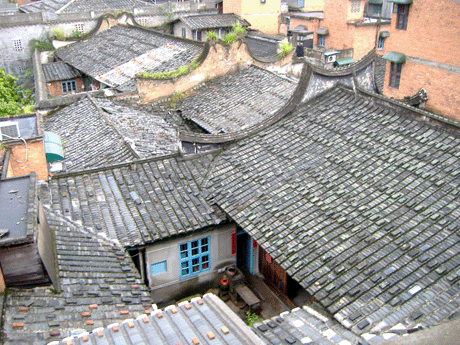That morning, the roosters crowed at four a.m., at the foggy gray-blue sky. There sat a plastic bag of heated milk in front of me. Closing my eyes, I remembered the taste, from a decade ago. A heavy wrap around one's tongue, a quick let go, an intensely sweet glob, a slow aftertaste turning bland within seconds.
It started raining after breakfast. The roof next door was flat and the rain turned the dark space into a hundred winking silver circles. The clothes on the hangers rotated wildly. Our window frames were as thin as pencils.
Before noon, we set off to visit my great-grandparents. We readied with our umbrellas, using them as canes after the rain stopped. In the town of Minan, the metal doors were all flung open. People gathered on stone benches outside, in the shadows of the brick hedges. The families here all knew each other, had raised children and waited for grandchildren together, had eased through Communism, poverty, and floods together. Many were wearing pajamas and house slippers, peeling mangoes and bananas. Time ticked leisurely by.
Stray dogs roamed about the narrow, slightly wet streets day and night, sniffing in gutters, avoiding eye contact, bones stiff with universal need. The scent of baked crabs hung in the air. I imagined the legs pointing upward toward the pot's lid, the eyes rolled back, the spots on their backs quivering against the steam as the fire twisted higher and higher.
The cars swooshed above us over the newly built iron bridge, over the wild grass, the slow bikes and wobbly wagons, and over an entrance gate inspired by dynasty-era temples. I hummed a song to myself as I followed behind.
I had a whimsical thought once, about a boy. The way he'd smile with his eyes so intensely that we'd all lose our senses. The way I'd stop moving so quickly, the way tragedy would part for us. He existed only with the guide of a melody, of an unrequited voice with lyrics blurred without the structure of time.
And so I played the song over and over.
Up in the mountains laid the gravestone of my great-grandparents. We built a fire and let the fake money be curled into blackening ashes. The smoke burned my eyes. When it started to rain, my grandma, with a smile that was not a toothy grin, said it was her mother-in-law crying. Then, the sky heaved rain and loosened wind. The crystal blue mountain ranges off in the horizon and the rice fields far below the banana trees was unlike anything I had ever seen.
On television that night, I watched the military be glorified in order to sell shampoo. I scratched at a series of mosquito bites and wondered what we had lost along the way, or maybe what we had never gained.
On the last day, the suitcases were too full to hold my stack of loose-leaf papers. I told my grandpa to keep it. And he said, "I'll save these. Next year, when you come back, you can use these to write, good, good."
And at dinner, he said, "When you come back next year, I'll take you back up the mountains to visit the temples, and then we will go look at the rivers," before throwing his daily pills into his mouth and making an awkward swallow. The light below the slow fan highlighted his boney back and the spacey glint in his eyes.
I said, "Yes, when I come back," though this visit added up to nine years since the last.
From the airplane, the sunrise looked like an oil painting, black and orange and yellow spilling into lime. The Pacific Ocean shone beneath. I imagined the echo of sea creatures under the velvet blanket of blue, a curvy whale making a solitary arch, a crab dragging across sand toward his mate.
The plane shook and I imagined a dead person's tears over the snapping of fire. We were all daughters and sons, standing close, the rain rushing through, letting us know that the flood of blood is universal.
Our smiles are so sweet some days that I crumble.


